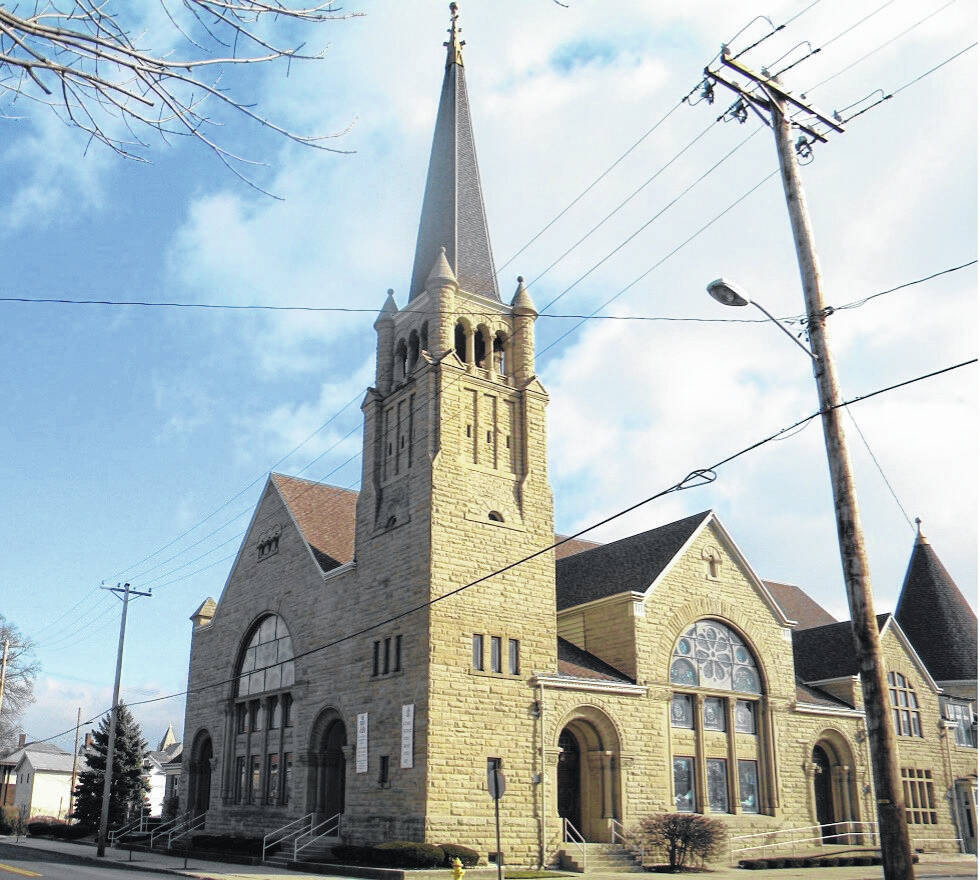
The Westminster Presbyterian Church in downtown Piqua is one of the eight properties featured on the Piqua-Caldwell Historic Holiday Tour. The tour is scheduled on Saturday, Dec. 9; tickets are $25 per person.
Submitted photo

St James Episcopal Church is one of the eight properties featured on the Piqua-Caldwell Historic Holiday Tour. The tour is scheduled for Saturday Dec. 9; tickets are $25 per person.
Submitted photo
PIQUA — The Piqua-Caldwell Historic District’s Historic Holiday Tour is scheduled for Saturday, Dec. 9, from 5 to 8 p.m.
Tour tickets are now available at piquacaldwellhistoricdistrict.org or Readmore’s Hallmark for $25. Interested tourists are encouraged to get their tickets early as this is a popular holiday event, and ticket sales are limited to 300 tourists.
This year are eight remarkable properties, according to a press release from the historic district, including the St. James Episcopal Church and Westminster Presbyterian Church. Below is a full list of properties included in this year’s tour. Watch for subsequent press releases with more detailed information about the individual properties.
2023 Historic Tour Properties
Soloman Rhodehamel House, owned by Mary Ann Beach, 410 N. Downing St.
Homer Nellis House, owned by Debbie & Curt Orr, 417 Caldwell St.
Francis Morrow House, owned by Lori Hedberg & Laura Schwein, 400 Caldwell St.
St James Episcopal, 200 W. High St.
Samuel Gordon House, owned by Sue and Don Smith, 333 W. Greene St.
Anderson-Bennett House, owned by Stacy & Benny Scott, 218 W. Ash St.
Westminster Presbyterian Church, 325 W. Ash St.
Non-District “Bonus House” – Jacob M Friedlich House, owned by Wendy Roth, 509 Broadway St.
ST. James Episcopal Church
In June of 1811, Col. John Johnston moved to Upper Piqua. A cemetery and cabin were to the left of his home and the first Episcopal Church services in Piqua were held there. 1822 Bishop Chase visited Piqua and appointed Col. John Johnston Lay Reader. Now 200 years ago, in 1823, the Rev. Intrepid Morse, who was visiting from Steubenville, Indiana, organized a parish.
In 1847, John, the son of Col. Johnston, donated the land on the corner of Wayne and High Streets, and a church was built facing Wayne Street. It was consecrated the same year.
The church was built on the same site facing High Street; the architects were Wing and Mahurin of Fort Wayne, Indiana, and the contractors were Morrow and Morrow of Muncie, Indiana. There is no official record of the style of the church; however, because of its square bell tower, it is thought to be of the Norman style.
Many of the items found in the church today, such as the font, pulpit, lectern, bishop, and priest chairs, and lovely rose window, were given to the Wayne Street church as memorials.
A major renovation of the nave and chancel was carried out in 1961, and in 1999, the interior was completely redecorated. St. James Episcopal Church is celebrating its 200th Anniversary and very much looks forward to sharing the history of its church with tourists on Dec. 9, 2023, during the Historic Holiday Tour.
Westminster Presbyterian Church
The story of Westminster Presbyterian Church in downtown Piqua goes back to the year 1816 with 10 founding members. At that time, 10-20 individuals lived in the area who were said to have “organized under the oak tree below the railroad.” Worship was held outdoors or in member’s homes until construction of the church began in February of 1889.
The land was originally owned by Matthew Caldwell Jr, Piqua’s founder and a member of Westminster. The site was purchased from his estate, and construction of a new majestic church building of Romanesque Revival design began. The sanctuary was dedicated on Sept. 12, 1891. This same period saw steady growth in membership; it is reported that 148 new members were added in 1891 alone. By the turn of the 20th century, over 800 people called Westminster home. The membership stood at over 1,000 at the start of World War Two, peaking at nearly 1,200 in the 1950s. This growth coincided with Piqua being home to several notable manufacturing businesses, including Orr Felt, French Oil, and Hartzell Propeller.
The Piqua-Caldwell Historic District Association, founded in 2017 and acquiring its 501(c)3 non-profit designation in 2019, is focused on “Preserving our Past for the Future”. To learn more about the Piqua-Caldwell Historic District, please visit piquacaldwellhistoricdistrict.org or follow us on Facebook (Piqua-Caldwell Historic District Association).


